Thomas B. Hoeksema Sr. established and taught in the special education program at Calvin College in Grand Rapids, Mich. Now retired, he serves on the Christian Learning Center Network board. He has compiled an annotated bibliography on the theology and practice of inclusion to help pastors and churches see people as so much more than any disabilities they live with.
These are books that he believes give a deep understanding of the theology and practice of inclusion and extend the ability to operate from a universal design perspective as you plan worship and other dimensions of life together in faith communities.
For preachers and others with an affinity for thinking theologically
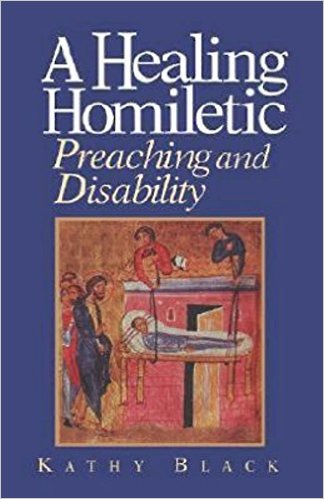 A Healing Homiletic: Preaching and Disability by Kathy Black (Nashville: Abingdon Press, 1996)
A Healing Homiletic: Preaching and Disability by Kathy Black (Nashville: Abingdon Press, 1996)
Preaching affects the exclusion or inclusion of persons with disabilities in communities of faith. Kathy Black looks at healing narratives in Scripture through the lens of disability, walking the reader through the hermeneutical hazards of literal and metaphorical interpretations. She offers new ways to think about disability and insights into what healing means. Black helps preachers consider the lived reality of disability as they prepare sermons on the gospel’s miracle narratives. A potential outcome is greater inclusion from the pulpit as well as in the pew.
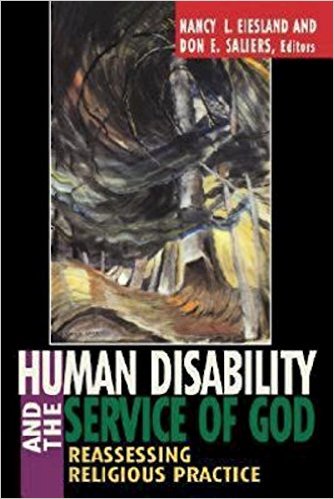 Human Disability and the Service of God: Reassessing Religious Practice by Nancy L. Eiesland and Don E. Saliers (Nashville: Abingdon Press, 1998)
Human Disability and the Service of God: Reassessing Religious Practice by Nancy L. Eiesland and Don E. Saliers (Nashville: Abingdon Press, 1998)
This edited volume offers fourteen chapters organized around the themes of biblical interpretation, theological reflection, cultural interpretation and practical theology. My personal favorite is Jurgen Moltmann’s essay, “Liberate Yourselves by Accepting One Another,” which brilliantly unpacks the reciprocity inherent in inclusiveness. Taken together, these essays show, as Stanley Hauerwas points out, that people who live with identified disabilities “help all Christians rediscover the extraordinary character of Christian worship and life.”
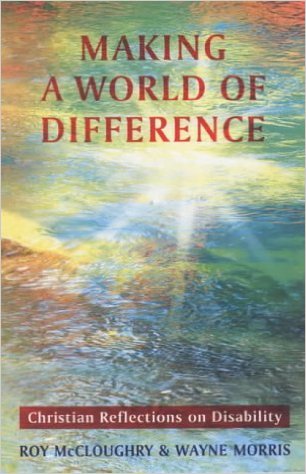 Making a World of Difference: Christian Reflections on Disability by Roy McCloughry and Wayne Morris (London: Society for Promoting Christian Knowledge, 2002)
Making a World of Difference: Christian Reflections on Disability by Roy McCloughry and Wayne Morris (London: Society for Promoting Christian Knowledge, 2002)
Churches have often held spiritually and emotionally unhealthy views of what it means to live with disability. By examining prevailing models of disability, readers of this theoretical work may be able to shift their own and, importantly, their church’s paradigms and practices. In wise discussions of topics such as imago dei, covenant, kingdom, the body of Christ, healing and wholeness, and friendship, McCloughry and Morris break down walls that divide people because of their human differences.
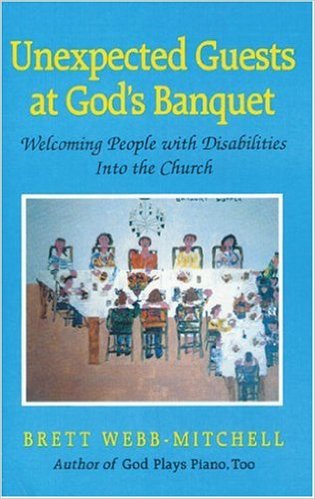 Unexpected Guests at God’s Banquet: Welcoming People with Disabilities into the Church by Brett Webb-Mitchell (New York: The Crossroad Publishing Company, 1994)
Unexpected Guests at God’s Banquet: Welcoming People with Disabilities into the Church by Brett Webb-Mitchell (New York: The Crossroad Publishing Company, 1994)
I love the chapter that unpacks the Luke 14 parable of the great banquet. It points out that each of us is the unexpected guest. This provides key recognition of our common need for God’s grace and a new understanding of what the Master intends the church and his kingdom to be. Webb-Mitchell is a superb storyteller who weaves in stories from his work as music educator, special educator and pastor. They reveal much that helps the reader see strength coexisting with weakness. This is one of the earliest books to argue that hospitality to strangers is not merely for the stranger but enables each of us to receive what the stranger has to offer.
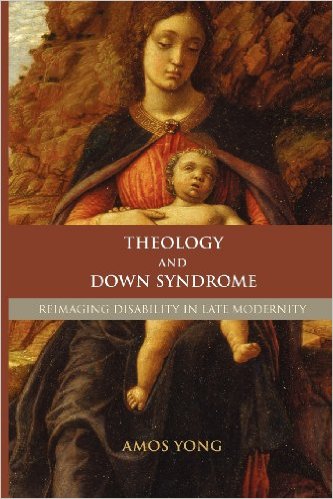 Theology and Down Syndrome: Reimagining Disability in Late Modernity by Amos Yong (Waco, Texas: Baylor University Press, 2007)
Theology and Down Syndrome: Reimagining Disability in Late Modernity by Amos Yong (Waco, Texas: Baylor University Press, 2007)
Unique among treatises on theology and disability, this masterwork provides insights from a pneumatological perspective. Yong aims to “contribute in some small way to the healing of the world so that it becomes a hospitable place for all people.” Though he begins with the specific classification of Down syndrome, Yong goes far beyond individuals with a particular label. He analyzes theological and philosophical issues and current ways of thinking about disability from the field of disability studies. He offers a social constructivist view that interrogates the way the church has responded to human differences and transforms the way humanness is understood. With scholarly acumen and a caring heart, Yong succeeds in helping readers re-imagine disability.
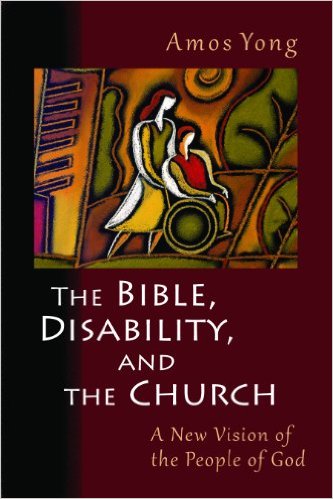 The Bible, Disability, and the Church: A New Vision of the People of God by Amos Yong (Grand Rapids, Mich.: Wm. B. Eerdmans Publishing Company., 2011)
The Bible, Disability, and the Church: A New Vision of the People of God by Amos Yong (Grand Rapids, Mich.: Wm. B. Eerdmans Publishing Company., 2011)
This text takes Kathy Black’s groundbreaking book on disability homiletics to the next level because it explores Old and New Testament texts and incorporates contemporary understandings of disability. Yong recognizes that the church historically has operated from a medical model of disability and perpetuated an ableist perspective in its theology and preaching. Yong, a rigorous scholar, guides readers through key biblical texts and invites them to reconsider traditional interpretations. He asks, “How can we identify and avoid readings that exclude people with disabilities and thus fragment the people of God, and how can we articulate instead a more inclusive understanding of disability from the biblical text?” He is sensitive to the ways in which usual readings of texts reflect a normate bias and thereby perpetuate stereotypes and marginalize people with disabilities. Yong argues for an approach to Scripture that is informed by experiences of disability. If you have time to read only one book in this bibliography, read this one.
Fine books for anyone advocating inclusiveness and supporting its practice
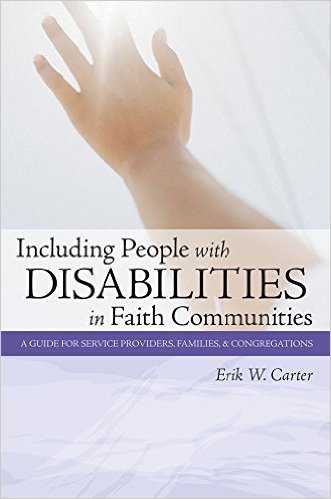 Including People with Disabilities in Faith Communities: A Guide for Service Providers, Families, & Congregations by Erik W. Carter (Baltimore: Paul H. Brookes Publishing Co., Inc., 2007)
Including People with Disabilities in Faith Communities: A Guide for Service Providers, Families, & Congregations by Erik W. Carter (Baltimore: Paul H. Brookes Publishing Co., Inc., 2007)
Eloquent and wise, this book is an invaluable resource for those who wish to create inclusive faith communities. It is an invitation to faith communities not only to make worship a shared experience but to experience and support each other in all dimensions of life together, whether in the sanctuary, church school classroom, fellowship hall or choir room, on Sunday or during the week. Carter champions the idea that communities are enriched by the contributions of persons too often seen only as people who need help. He offers a cornucopia of practical strategies with many examples from real world contexts to help you make your church a place where everyone belongs and everyone serves.
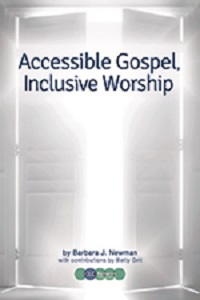 Accessible Gospel, Inclusive Worship by Barbara J. Newman with contributions by Betty Grit (Grand Rapids, Mich.: CLC Network, 2014)
Accessible Gospel, Inclusive Worship by Barbara J. Newman with contributions by Betty Grit (Grand Rapids, Mich.: CLC Network, 2014)
Designing an inclusive worship environment is not just for including people previously excluded. The kernel idea is to foster faith formation for everyone by enabling everyone to enter into the conversation with God that we call worship. When diverse people worship together, everyone receives previously unimagined blessings. Sometimes new tools are needed to make this happen. One of Newman’s key strategies is to use the structure of Vertical Habits, familiar to many who access Calvin Institute of Christian Worship resources, in multisensory ways. Incorporating this and Newman’s other strategies will help your faith community make the gospel accessible to people across the lifespans and varied dimensions of human diversity.
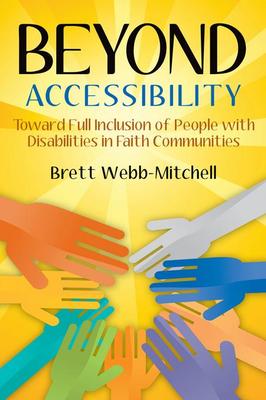 Beyond Accessibility: Toward Full Inclusion of People with Disabilities in Faith Communities by Brett Webb-Mitchell (New York: Church Publishing, 2010)
Beyond Accessibility: Toward Full Inclusion of People with Disabilities in Faith Communities by Brett Webb-Mitchell (New York: Church Publishing, 2010)
As much as I like Webb-Mitchell’s earlier book, Unexpected Guests at God’s Banquet, this newer book goes further in explaining how faith communities can become more authentically inclusive. Make no mistake: This book also explores biblical grounds for such an effort. Webb-Mitchell beautifully develops concepts such as hospitality, mutuality and the body of believers—and takes us deeper. Beyond simple acceptance and creating accessibility by removing barriers of architecture and communication, he shows how to bring about a deeper communion of the saints by describing inclusive congregational practices.

